 |
Chess Tidbits |
World Championship 2024
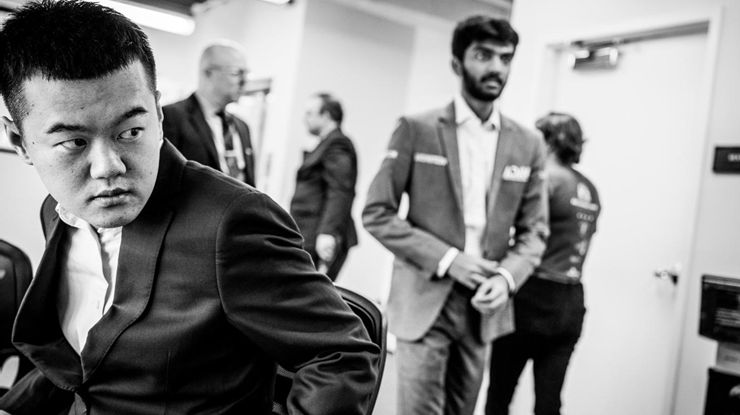
Photo: Lennart Ootes/Grand Chess Tour.
The 2024 FIDE World Championship Match between Gukesh and defending champion Ding Liren will take place in Singapore's Resorts World Sentosa, a premier resort known for its world-class facilities, from 20th November to 14th December 2024.
Changes in World Chess Championship 2024
The upcoming 2024 FIDE World Championship between GM Ding Liren and the youngest challenger in history, GM Gukesh Dommaraju, will have a few differences from previous editions. FIDE has announced the official regulations, including changes aimed to encourage more decisive games in faster time controls.
Notably, the $2.5 million prize fund will be distributed in a way that incentivizes playing for wins: Each player will receive $200,000 for every game they win, and the rest will be split equally. If the match goes to tiebreaks, the winner will receive $1.3 million while the runner-up will receive $1.2 million (this split will also apply if the match ends 7.5-6.5 or 8-6 with 13-14 decisive games).
In past championships, there was no bonus for the number of wins. The match winner would receive 60% of the prize fund while the runner-up would receive 40%, unless the match result was decided by tiebreaks, when the split was 55:45.
This World Championship match will be a 14-game encounter, with each game played in the classical format. The player who scores 7.5 points or more wins the World Championship Match. If the score after fourteen games is equal, then tiebreaks will be played in the rapid format first then the blitz format.
The tiebreak system has also been adapted to favour shorter games with consideration for the players' preferences. In the announcement, FIDE explained:
"After consultations with both players, the format for tiebreaks has been changed to introduce a gradual decrease in time controls."
In the 2023 tiebreak, the rules stipulated that players would play four games of 25 minutes plus a 10-second increment per move. If the score was level after these four games, the match would proceed to the next tie-break stage, which was a blitz playoff.
In 2024, if the scores are level after 14 classical games, four games of 15 minutes (rather than 25 minutes) plus a 10-second increment per move would be played. If the score remained level after these four games, a two-game rapid playoff of 10 minutes plus a 5-second increment per move would follow — this is an additional stage added.
In the rules for the 2023 world chess championship match, between Ding Liren and Nepomniachtchi, the blitz stage of the playoff stipulated a two-game blitz playoff of five minutes plus a 3-second increment per move. If the score remained level after these two games, another two-game blitz playoff would follow. If the game was still tied, a single game of 3 minutes for each player + 2 seconds increment per move would be played. If this game were drawn, another game of 3 minutes for each player + 2 seconds increment per move would be played, with colours reversed. This was to be repeated until there would be a decisive result.
In the 2024 world chess championship match between Gukesh and Ding Liren, if the score remains level after the two-game rapid playoff of 10 minutes plus a 5-second increment per move a blitz playoff would be played. In this stage, there would be a two-game blitz playoff of 3 minutes plus a 2-second increment per move. If this did not yield a champion, a single game of 3 minutes for each player + 2 seconds increment per move would be played. If this game is drawn, another game of 3 minutes for each player + 2 seconds increment per move would be played with colours reversed. This will be repeated until there is a decisive result.
Additionally, time controls will be faster. In the classical match games, players will have two hours for 40 moves and then 30 minutes for the rest of the game with a 30-second increment starting from move 41. Previously, players would receive an additional 60 minutes at move 40 and 15 minutes at move 60, with an increment from move 61.
The schedule for the championship also has a faster format. There will be three games followed by a rest day, with only four rest days in total. In 2023 for Ding vs. GM Ian Nepomniachtchi there were seven rest days, with no more than two games played before a rest day. It is closer to the schedule of 2021, when there were five rest days in GM Magnus Carlsen vs. Nepomniachtchi.
Sinquefield Cup 2024
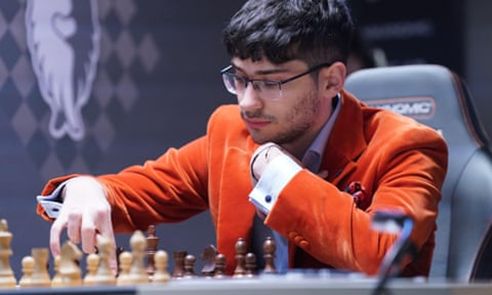
Alireza Firouzja, the Iran-born Frenchman, is a rekindled talent after the 21-year-old triumphed unbeaten in Sinquefield Cup at St Louis with a score of 6/9. It fetched him a reward of $350,000.
Firouzja totalled 6/9, half a point ahead of the US champion and world No 3, Fabiano Caruana. These two were followed by Abdussatarov and MVL at 3rd place.
The world champion, Ding Liren, drew his first six games and lost two of his final three games and finished next to last on 3.5/9.
The prestigious event, named after the chess benefactor Rex Sinquefield, is one of the game's three elite super-tournaments, along with Tata Steel Wijk aan Zee in the Netherlands and Norway Chess at Stavanger.
Three years ago, Firouzja seemed destined for a quick journey to the top. He was the youngest ever to reach a 2800 rating, easily qualified for the 2022 Candidates, and was widely regarded as Magnus Carlsen's heir apparent.
Then came failures in the 2022 and 2024 Candidates, a quarrel with the Wijk aan Zee organisers, an episode of all-night one-minute bullet games in the middle of a major tournament, a decision to work on an alternative career in fashion design, and an alarming drop in the world rankings from second to 16th. Some believed that he had lost the dedication and commitment to succeed at the highest level. He has slowly returned to #5 in world ranking in Sep 2024.
Biel 2024
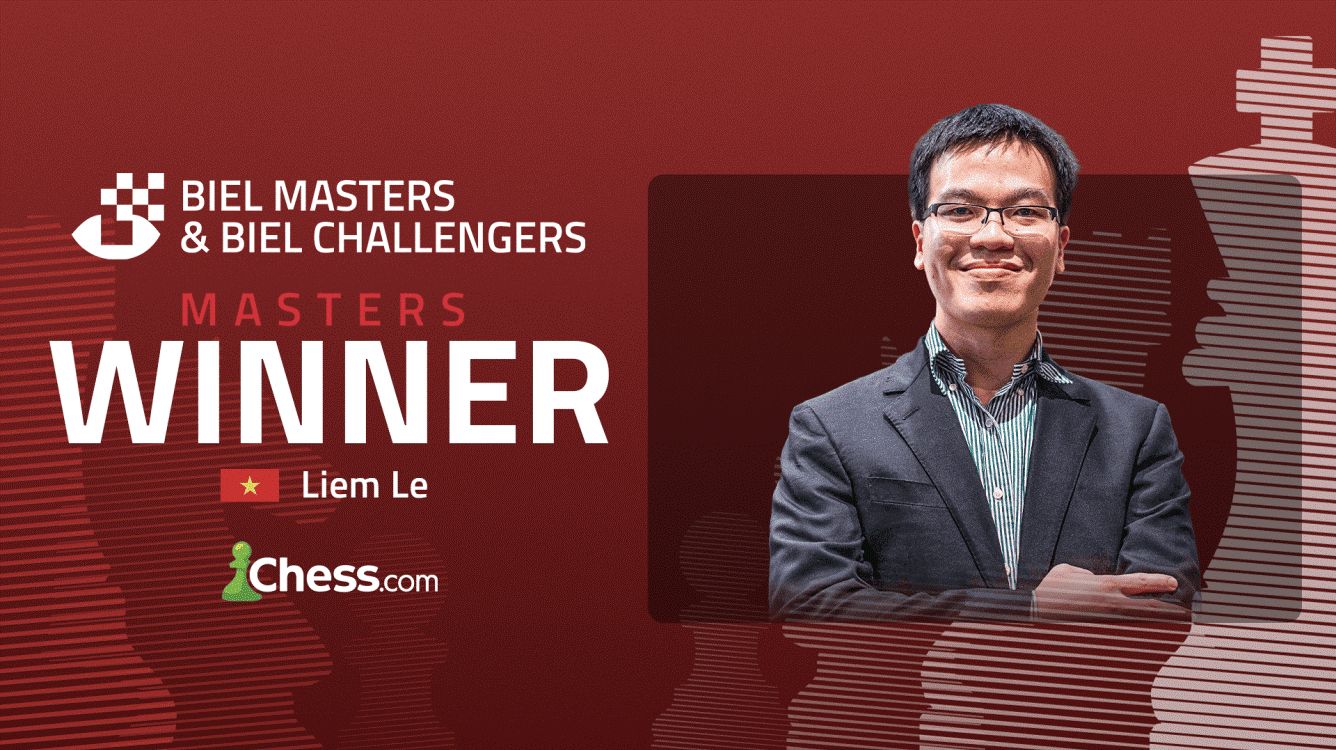
GM Le Quang Liem has won the 2024 Biel Chess Festival with a round to spare after defeating GM Praggnanandhaa Rameshbabu with the black pieces. The U.S.-based Vietnamese number-one has now won the title for three consecutive years. Le's looking forward to next year, when he can match Maxime Vachier-Lagrave's four titles in a row!
He also famously beat World champion Ding Liren at the recent Olympiad in Sep 2024, the only defeat for the latter.
Chess Olympiad Budapest 2024
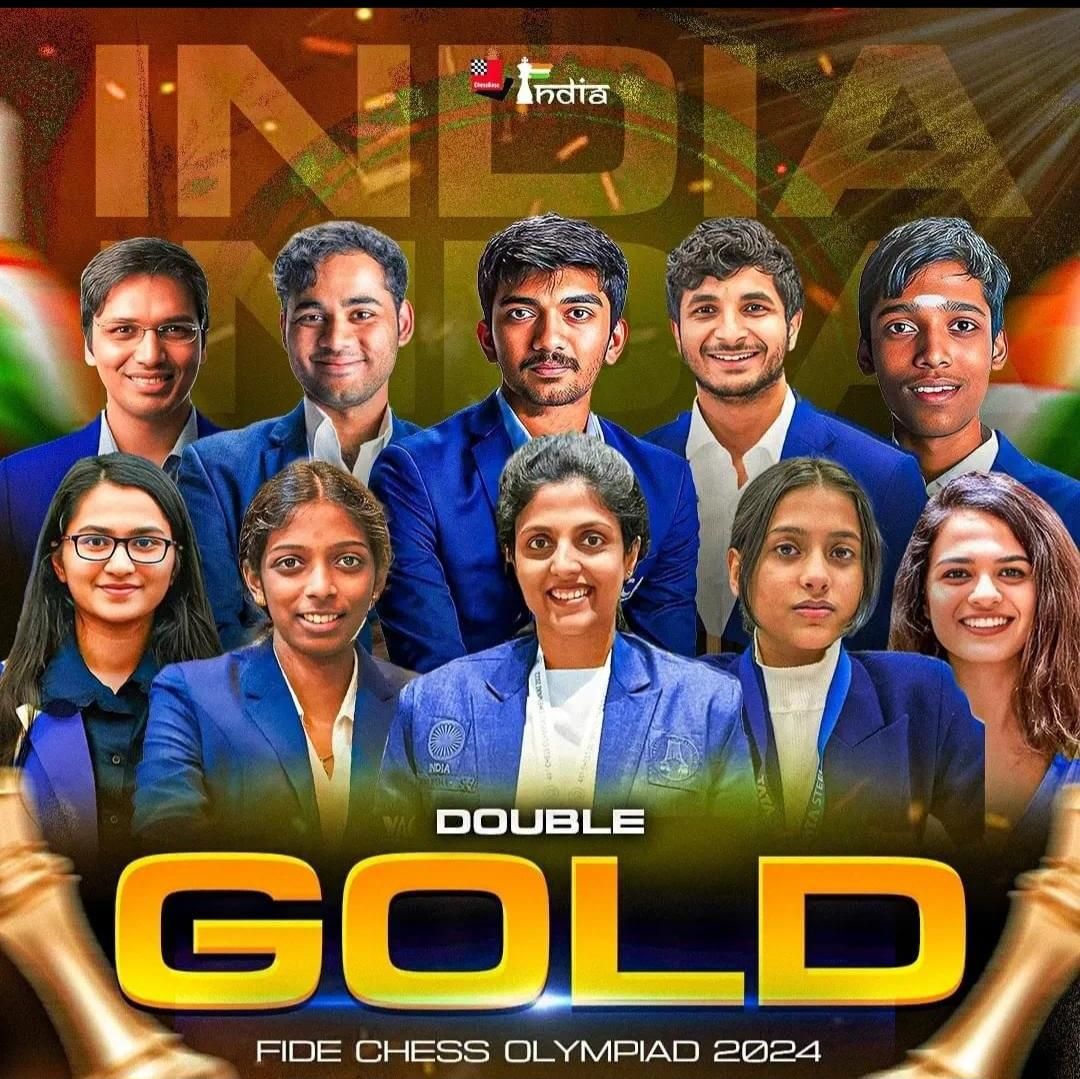
Women's: Vantika Agrawal, R.Vaishali, Harika D, Divya Deshmukh, Tania Sachdev
Indian team: Photo Source: Chessbase India
The 45th Chess Olympiad held at Budapest, Hungary will be remembered for the resounding success of Indian teams. They won double golds in the Open and Women's categories. A total of six gold medals were won by the Indian teams. Besides the team golds, Gukesh (first board), Arjun (third board), Divya Deshmukh (third board) and Vantika Agrawal (4th board) were individual gold medal winners.
Our outstanding performers were the fabulous four of Gukesh 9/10 (TPR 3056), Arjun 10/11 (TPR 2968), Divya 9.5/11 (TPR 2608) and Vantika 7.5/9 (TPR 2558).
Team medals:
Open
- India (21/22)
- US (17/22)
- Uzbekistan (17/22)
Women
- India (19/22)
- Kazakhstan (18/22)
- US (17/22)
The full list of individual medal winners is as follows:
Open:
1st board: Gukesh (Ind), Abdussattorov(Uzb), Carlsen (Nor)
2nd board: Thai Dai van Nguyen (Czech), Lazov (Macedonia), Ediz Gurel(Turkiye)
3rd board: Arjun (Ind), Yu Yangyi (Chn), Le Tuan Minh (Viet)
4th board: Vokhidov (Uzb), Aronian (US), Alan Pichot (Spain)
Reserve board: Svane (Ger), Gledura (Hungary), Ivic (Serbia)
Women:
1st board:Zhu Jiner (China), Sarasadat (Spain), Nana Dzagnidze (Geo)
2nd board: Carissa Yip (US), Elizabeth Paetz (Ger), Yuxin Song (China)
3rd board: Divya Deshmukh (Ind), Sabrina Vega (Spain), Elina Daniellian (Arm)
4th board: Vantika Agrawal (Ind), Alice Lee (US), Anna Sargsyan (Arm)
Reserve board: Kochavi Dana(Israel), Nodira (Uzb), Lu Miaoyi (China)
India won the Gaprindashvili Cup for the second consecutive time for the best performance for open and women's teams, ahead of US (Silver) and Armenia (Bronze).
Dana Kochavi, playing as reserve for Israel scored a perfect score of 8/8 with a TPR 2676, highest for women, followed by Carissa Yip for US with a score of 10/11 with a TPR of 2634.
The next Olympiad will be at Tashkent (Uzb) in 2026.
Selected Games from the Open Section
Note: The panel below includes 30 games.
Selected Games from the Women's Section
Note: The panel below includes 17 games.

How AIWCF Members Reacted to the News
KVL Narayana:
My affectionate and admirable little champ (Gukesh) has done it again. With 8/9 on top board and ELO 3041 rating performance, he is instrumental (besides our other champ Arjun Erigaisi with 9/10 on third board with ELO 2960 rating performance) in our Indian team clinching the chess Olympiad gold with a round to spare. (for all practical purposes-very remote theoretical chance for this not to occur) He beat world #3 Caruana (yes, it's a repetition- he beat him in the Chennai Olympiad 2022 as well) in last round. He will be crowned as World champion (yes, my gut feeling) in Singapore in about 3 months and will cross historic 2800 rating and will be breathing on Magnus' neck for the top rating spot.
Mohan Turaga:
Chess Olympiad 2024 was played at an incredibly high level as seen by the accuracy level of Open players. All Indian players played at almost the same accuracy level. Ding Liren also played at the same level of accuracy although he faded away towards the second half of the tournament. If Ding can maintain his high level with consistency, then we can expect a good fight in the World championship match. Gukesh is still the favourite to win because he maintains consistency at a high rate of accuracy. A single bad game can mean the loss of Championship. Such is the closeness in the level at which these players are playing chess. Is Ding deliberately not playing to win in the Olympiad so that Gukesh may underestimate him?
Devangshu Datta:
A match is totally different from a tournament.
Mohan Turaga:
This is what Kramnik said before his World Championship match with Anand and he lost. The stronger and luckier player wins many times by a tiebreak under faster time controls. So nowadays, World Championship is not about winning in Classical games, Magnus Carlsen's wins against Caruana and Karjakin come to mind.
Anil K. Anand:
Interesting perspective. If four key results went in China's favour at the Olympiad: 1.Wei Yi vs Gukesh 2. Wesley So vs Wei Yi 3.Ding vs Le Quang Liem 4.Ding vs Abdussatarov the final standings might have been quite different. It seemed to me that Ding didn't show his real strength in the Olympiad though he played correctly, but took tame draws or played casually in superior positions. On the other hand, his teammate and top-10 player Wei Yi was trying to win every game. He was at 4/5 before he lost to Gukesh but still stood 4th on Board 2. I'm worried that if Ding vs Gukesh classical games end in a draw, Ding will prevail due to his superiority in speed chess. He is one of the guys to beat Carlsen in speed chess at tie-breaks.
Let us not forget that China won consecutive gold medals in 2014 and 2018, while Ding won bronze and gold medals respectively on Board 1 during these events.
Mohan Turaga:
I think Ding is using the Art of War technique of Sun Tzu, fooling the whole world.
Pragg also took many draws and his own assessment is that he had a poor tournament because of the results but if you see his accuracy, he played very strong chess but his oppenents played equally well. So draws were the results but performance was not poor at all. Steinitz: "You can win a chess game only if your opponent makes mistakes."
Mohan Turaga:
The accuracy of Ding in this Olympiad shows that he is a very strong player and can match any Indian player but he took many draws, may be intentionally. Chinese chess federation may have approved this plan. We have to be cautious.
Devangshu Datta:
At his very best Ding is stronger than Gukesh and he has a much better Rapid and Blitz record. Even if Ding is not at his best, he may be good enough to hold Gukesh in classical and beat him in rapid.
Gukesh has to win in classical or improve very substantially in rapids.
4 of last 7 title matches were decided on rapids. So Ding has a significant edge in that sense.
Perfect 10 score in chess
Dana Kochavi scored 8/8 at the Budapest Chess Olympiad in Sep 2024. Around same time, Andrea Navrotescu achieved extraordinary 9/9 in the Vera Menchik Memorial in London. She had earlier won an individual silver at the Olympiad in 2016.
As per Wikipedia, the following are the known perfect scores in chess so far:
In top-class chess, it is rare for a player to complete a tournament or match with a 100% score. Some notable examples are:
- Gustav Neumann at Berlin in 1865. (34/34)
- William Pollock at Belfast 1886. (8/8)
- Emanuel Lasker at New York in 1893. (13/13)
- Henry Atkins at Amsterdam 1899. (15/15)
- José Raúl Capablanca at New York in 1913. (13/13, including one default)
- David Janowski at Paris in 1914. (9/9)
- Alexander Alekhine at Moscow in 1919–20
- Boris Kostić at Hastings 1921–22. (7/7)
- Bobby Fischer at the US Championship of 1963/64. (11/11)
- Alexander Beliavsky at Alicante in 1978. (13/13)
- Sandro Mareco at Montevideo in 2017. (9/9)
Vera Menchik won four consecutive Women's World Chess Championship tournaments with perfect scores, a total of 45 games (8–0 at Prague 1931, 14–0 at Folkestone 1933, 9–0 at Warsaw 1935, and 14–0 at Stockholm 1937).
Alekhine scored 9/9 on first board for France at the 3rd Chess Olympiad (Hamburg, 1930), and Dragoljub Čirić scored 8/8 as second reserve (the sixth player on his team) for Yugoslavia at the 17th Olympiad (Havana, 1966), but each played only about half of the possible games. Robert Gwaze scored 9/9 on first board for Zimbabwe at the 35th Olympiad (Bled, 2002).
Valentina Gunina won the Women's section of the 2010 Moscow Blitz tournament with a 17/17 score.
Wesley So scored 9/9 in the 2011 Inter-Provincial Chess Team Championship, won the gold medal in men's blitz at the SEA Games 2011 at Indonesia with a score of 9/9 and won the 2013 Calgary International Blitz Championship with a score of 9/9.
The youngest player to obtain a perfect score in a National Blitz Chess Championship anywhere in the world is Jack Mizzi, who in September 2023 won 9/9 games at the Malta Open Blitz Championship at age 17.
In 2014, Fabiano Caruana won the Sinquefield Cup, recording a 3098 performance rating, the highest in history at the elite level. Caruana won with 8½ points out of 10 games the Sinquefield Cup in Saint Louis, Missouri, one of the strongest tournaments ever held, featuring six of the world's top ten players, including the world champion Magnus Carlsen. With seven consecutive wins (7/7) from the start, 3 draws and 0 losses, Caruana ultimately achieved a performance rating of 3098, the best tournament result in history at that time, beating out Magnus Carlsen in the 2009 Nanjing Pearl Spring tournament (3002) and Anatoly Karpov (2985) in the 1994 Linares chess tournament.
The highest known tournament performance rating with a perfect score 9/9 is 3103, achieved by Karen H. Grigoryan, at the 2019 Cidade de Famalicão tournament. D. Gukesh's score of 9/10 at the Budapest Olympiad 2024 had a performance rating of 3056.
In the last 30 years, the 5 greatest ELO performances ever are: Karpov in 1994, Carlsen in 2009, Caruana in 2014, Grigoryan in 2019 and Gukesh in 2024.
Perfect scores were achieved in matches by the following:
- Howard Staunton over Daniel Harrwitz in 1846. (7/7)
- Wilhelm Steinitz over Joseph Henry Blackburne in 1876. (7/7)
- Capablanca over Kostić in 1919. (5/5)
- Fischer over Mark Taimanov in 1971. (6/6) (quarter-final Candidates Match)
- Fischer over Bent Larsen in 1971. (6/6) (semi-final Candidates Match)
Speed Chess 2024
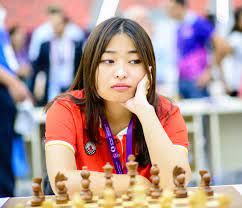
Ju Wenjun won the 2024 Women's Speed Chess Title beating surprise qualifier Polina Shuvalova. R.Vaishali came 3rd.
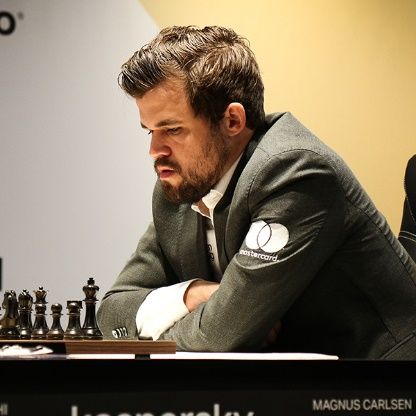
Carlsen won the 2024 Men's Speed Chess title beating Alireza Firouzja. Nakamura beat Niemann to come 3rd.
61st National Championship: GM Karthik Venkataraman
GM Karthik Venkataraman pipped top seed Surya Sekhar Ganguly and won the 61st edition of the Indian National Championship after scoring 9/11 points at the event organized by the Haryana Chess Association.
This is the second victory in a national championship for Karthik, who had also won the tournament in 2022. GM Surya Sekhar Ganguly and unfancied IM Neelash Saha scored the same points as the champion, but finished in second and third place respectively on tiebreaks.